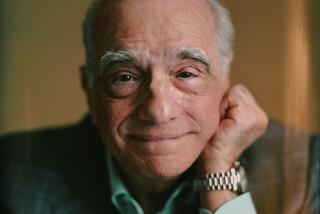MOVIE REVIEW : ‘THE NAME OF THE ROSE’ NOT A SWEET SUCCESS
Watching “The Name of the Rose,” you may find yourself as torn as one of Umberto Eco’s conscience-wracked, 14th-Century monks.
Yes, it is splendid that anyone would take on so formidable a project as Eco’s 500-page chambered nautilus of a novel. Yes, this certainly feels like a 14th-Century Italian abbey, bleak, drafty and forbidding. Yes, it looks like it too--the 14th-Century as cast by Federico Fellini, every face a grotesque. But no, sad to say, it isn’t a perfectly marvelous film. (It opens today at the Egyptian, Westwood and Cineplex Odeon, Fairfax.)
From the moment the credits announce that Jean-Jacques Annaud’s film is “a palimpsest of Umberto Eco’s novel,” you know that you’re in for heavy cultural weather.
(To save a rush for the library in the movie’s first two minutes, my dictionary calls a palimpsest a parchment that has been written on two or three times and improperly erased, so that the first text still remains faintly visible. I know you knew it. I forgot.)
Such a detail does honor to the twinkly, recondite Eco, but it wreaks havoc with a film that must move and remain a beacon of clarity in a deliberately obfuscated story. And it isn’t Eco that shines through, it’s Annaud, and this time “Quest for Fire’s” director has fashioned a soggy, lumpen mystery. (The script is credited to four writers, never a good sign unless three of them are Elaine May. They are Andrew Birkin, Gerard Brach, Howard Franklin and Alain Godard.)
Eco’s playful conceit was to drop an English Franciscan monk (Sean Connery) and his young novice (Christian Slater) into a rich Italian Benedictine monastery on a mission of conciliation from Louis IV, head of the Holy Roman Empire. It is the time when papal delegates are gathering at this forbidding abbey for debates that will determine the future of the Catholic Church.
The story’s kicker is that the monk, William of Baskerville, thinks and acts like Sherlock Holmes. His novice is even named Adso (or, in French, Adson) giving rise to all sorts of little jokes such as, “My dear Adson, it’s elementary.”
Just as William arrives, the first in a series of murders begins. Knowing his skills at detection/deduction, the abbot (Michael Lonsdale) asks him to investigate, as the friars begin dropping like fruit flies, from bell towers, into soup kettles, over their tasks of manuscript illumination.
The final complication is the (very late) arrival of the papal Inquisitor, Bernardo Gui (F. Murray Abraham), no friend of the Franciscans and an old adversary of William of Baskerville. Gui is there to sniff out the devil behind every unexplainable occurrence and to eradicate his traces by some of the Inquisition’s nastier methods.
There are lovely details to “The Name of the Rose,” one of the warmest of which is the relationship between the grizzled William and his downy novice (played memorably by Slater). Unexpectedly faced with the temptations of the flesh in the form of a starving peasant girl (Valentina Vargas), Adson offhandedly asks his master in the privacy of their shared cell if he has ever been in love. Absolutely, William says, “with Aristotle, Ovid, Virgil, Thomas Aquinas. . . .. “
While moments like that cast their own glow, and while it’s thrilling to have an immaculately mounted film in which men would die for the contents of a book, it is almost diabolical how Annaud gets in his own way in the telling of his story.
His pacing is flaccid, with absolutely no sense of urgency and no discernible rhythm. The continuity is so bollixed up that it is sometimes impossible to guess where we are in a scene. Having placed us deep within this cavernous monastery, Annaud suddenly pulls away for a glimpse of the abbey from, what? A circling hawk? Whatever the point of view, it completely shatters the mood.
Annaud has a passion for detail, certainly, and a justly celebrated production designer (Fellini and Pasolini’s Dante Ferretti) and lighting cameraman (Tonino Delli Colli, of “Seven Beauties” and “Once Upon a Time in America,” among others). But the details never blur into a rich backdrop; the editing is so jumpy that each scene stays resolutely separate. In that respect, James Horner’s original and sonorous score is a major help in creating atmosphere and holding fragments of scenes together.
It’s also exhausting to have each face (except for Connery’s and Slater’s) a Grand Guignol masterpiece of decay. Combined with the actors’ Tower of Babel collection of accents (from Paris, Brooklyn, Moscow, London, Manhattan, Edinburgh, Santiago and more), it makes this a four-star monastery of the self-consciously bizarre.
Few actors can fight their way through all this. Connery does, firmly, with intelligence and a notable ring of irony and humanism--he’s one of the few actors who can wear what looks like a gray Army blanket and still be a figure of fascination. Ron Perlman (one of “Quest for Fire’s” more memorable cave men) makes Salvatore, the hunchbacked monk, stirring and pitiful. But Abraham, overacting fiercely--in what feels like a drastically truncated role--shifts his eyes back and forth as though he were following some holy Teleprompter, and William Hickey seems determined to sing his role.
‘THE NAME OF THE ROSE” A 20th Century Fox release of a Bernd Eichinger/Bernd Schaefers-Neue Constantin/Cristaldifilm/Films Ariane co-production in association with ZDF. Producer Eichinger. Executive producers Thomas Schuehly, Jake Eberts. Co-producers Franco Cristaldi, Alexandre Mnouchkine. Director Jean-Jacques Annaud. Screenplay Andrew Birkin, Gerard Brach, Howard Franklin, Alain Godard. Camera Tonino Delli Colli. Production design Dante Ferretti. Art direction Giorgio Giovannini, Rainer Schaper; set decoration Francesca Lo Schiavo. Editor Jane Seitz. Music James Horner. Costumes Gabriella Pescucci. Sound Frank Jahn. Supervising makeup artist Hasso Von Hugo. Production executive Anna Gross. With Sean Connery, F. Murray Abraham, Christian Slater, Elya Baskin, Feodor Chaliapin Jr., William Hickey, Valentina Vargas, Michael Lonsdale, Ron Perlman, Volker Prechtel, Pete Lancaster.
MPAA-rated: R (persons under 17 must be accompanied by parent or adult guardian).
Running time: 2 hours, 10 minutes.
More to Read
Only good movies
Get the Indie Focus newsletter, Mark Olsen's weekly guide to the world of cinema.
You may occasionally receive promotional content from the Los Angeles Times.










